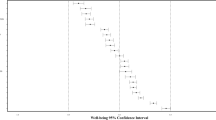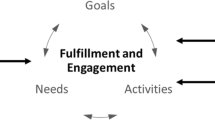Abstract
Objectives
Previous research suggests married individuals tend to be healthier and happier, however, we know little about the associations between subjective well-being and marriage expectations among never-married emerging adults, with less research in Asian context. This study examined how national context and individual subjective well-being are associated with emerging adults’ marriage expectations in three Asian countries—South Korea, China, and Vietnam—which share the traditional Confucian marriage norms but differ in the degree of industrialization.
Methods
Using convenience sampling, data came from 1,019 never-married college students living in the cities of Korea, China, and Vietnam.
Results
The majority of the participants across the three countries had marriage intentions. The higher the subjective well-being, the more likely the participants were to have marriage intentions, and the earlier the expected marriage age. Cross-country difference was observed such that emerging adults from Korea were more likely to expect later marriage age than their counterparts from China and Vietnam. There was also gender difference in the association between subjective well-being and expected marriage age; the negative association between subjective well-being and expected marriage age was found for men, but not for women.
Conclusions
The current study provides empirical evidence that national context and subjective well-being are associated with emerging adults’ expectations about future marriage. Given that higher subjective well-being was associated with more intentions to marry and an earlier expected marriage age beyond the national context, enhancing individual well-being through mental health promotions could be an effective pro-marriage policy.

Similar content being viewed by others
References
Arnett, J. J. (2000). Emerging adulthood: A theory of development from the late teens through the twenties. American Psychologist, 55(5), 469–480.
Becker, G. S. (1991). A treatise on the family. Harvard, MA: Harvard University Press.
Bélanger, D., & Linh, T. G. (2011). The impact of transnational migration on gender and marriage in sending communities of Vietnam. Current Sociology, 59(1), 59–77.
Billari, F., & Kohler, H. (2004). Patterns of low and lowest-low fertility in Europe. Population Studies, 58, 161–176.
Binh, N. T. (2012). Age at first marriage in recent years Vietnam. Mediterranean Journal of Social Sciences, 3(1), 491–496.
Boehm, J. K., & Lyubomirsky, S. (2008). Does happiness promote career success? Journal of Career Assessment, 16, 101–116.
Brown, S. L. (2000). Union transitions among cohabitors: The significance of relationship assessments and expectations. Journal of Marriage and Family, 62, 833–846.
Carroll, J. S., Willoughby, B., Badger, S., Nelson, L. J., Barry, C. M., & Madsen, S. D. (2007). So close, yet so far away: The impact of varying marital horizons on emerging adulthood. Journal of Adolescent Research, 22(3), 219–247.
Chen, X.(2015). Relative deprivation and individual well-being: Low status and a feeling of relative deprivation are detrimental to health and happiness. IZA World of Labor, 2015, 140. https://doi.org/10.15185/izawol.140.
Coontz, S. (2004). The world historical transformation of marriage. Journal of Marriage and Family, 66, 974–979.
Diener, E., Nickerson, C., Lucas, R. E., & Sandvik, E. (2002). Dispositional affect and job outcomes. Social Indicators Research, 59(3), 229–259.
DiPietro, W. R. (2009). Happiness and economic progress: A perspective. Business Renaissance Quarterly, 4(4), 81–92.
Fishbein, M., & Ajzen, I. (2010). Predicting and changing behavior: The reasoned action approach. New York, NY: Psychology Press.
Gassanov, M., Nicholson, L., & Koch-Turner, A. (2008). Expectations to marry among American youth: The effects of unwed fertility, economic activity, and cohabitation. Youth & Society, 40(2), 265–288.
Geist, C. (2008). The marriage economy: Examining the economic impact and the context of marriage in comparative perspective (Unpublished doctoral dissertation). Bloomington, IN, USA: Indiana University.
Goode, W. (1963). World revolution and family patterns. New York, NY: Free Press.
Hippen, K.A. (2016). Attitudes toward marriage and long-term relationships across emerging adulthood (Unpublished master’s thesis). Atlanta, GA, USA: Georgia State University.
Hyundai Economic Research Institute. (2015). The lowest economic happiness since 2013. VIP Report, 15(25), 1–14.
Ji, Y. (2015). Asian families at the crossroads: A meeting of East, West, tradition, modernity, and gender. Journal of Marriage and Family, 77, 1031–1038.
Ji, Y., & Yeung, W. J. (2014). Heterogeneity in contemporary Chinese marriage. Journal of Family Issues, 35(12), 1662–1682.
Jones, G. W. (2005). The “flight from marriage” in South-East and East Asia. Journal of Comparative Family Studies, 36(1), 93–119.
Jones, G. W. (2007). Delayed marriage and very low fertility in Pacific Asia. Population and Development Review, 33(3), 453–478.
Jones, G. W., & Gubhaju, B. (2009). Factors influencing changes in mean age at first marriage and proportions never marrying in the low-fertility countries of East and Southeast Asia. Asian Population Studies, 5(3), 237–265.
Jones, G.W., Hull, T.H., & Mohamad, M. (Eds.). (2011). Changing marriage patterns in Southeast Asia: Economic and socio-cultural dimensions. London: Routledge.
Kefalas, M. J., Furstenberg, F. F., Carr, P. J., & Napolitano, L. (2011). “Marriage is more than being together”: The meaning of marriage for young adults. Journal of Family Issues, 32(7), 845–875.
Kim, K. (2017). The changing role of employment status in marriage formation among young Korean adults. Demographic Research, 36, 145–172.
Koo, J., Lee, A., & Suh, E. (2009). Social consequences of happiness: Are happy people popular? Korean Journal of Psychological and Social Issues, 15(1), 29–47.
Kwon, T. (2007). Trends and implications of delayed and non-marriage in Korea. Asian Population Studies, 3(3), 223–241.
Lee, S., Shin, I., Cho, N., Kim, H., Jeong, Y., Choi, Y., & Lee, I. (2005). Study on Low Fertility Causes and Comprehensive Plans. Seoul: Korea Institute for Health and Social Affairs.
Mastekaasa, A. (1992). Marriage and psychological well-being: Some evidence on selection into marriage. Journal of Marriage and Family, 54(4), 901–911.
Nguyen, T. H., & Phi, H. N. (2014). Xu huong ket hon muon va nhung quan niem moi ve hon nhan va gia dinh cua nhom phu nu do thi. [Delay in marriage and new perceptions about marriage and family among urban women]. In H. M. Nguyen (Ed.), Gia dinh Viet Nam trong qua trinh cong nghiep hoa va hien dai hoa: tu cach tiep nhan hoi nhap va so sanh (pp. 358–374). Hanoi: Nha xuat ban khoa hoc xa hoi.
OECD. (2015). How’s life? 2015: Measuring well-being. Paris: OECD Publishing. 10.1787/how_life-2015-en.
Oh, C., & Choi, S. (2012). The empirical study on the cause of low fertility-factors to impact on falling of nuptiality and rising of age at first marriage. The Journal of Public Welfare Administration, 22, 91–125.
Qian, Y. (2017). Gender asymmetry in educational and income assortative marriage. Journal of Marriage and Family, 79(2), 318–336.
Quah, S. R. (2008). Families in Asia: Home and kin. Milton Park, Abingdon, Oxon, New York, NY: Routledge.
Senik, C. (2014). Wealth and happiness. Oxford Review of Economic Policy, 30(1), 92–108.
Statistics Korea (2016). Marriage and divorce statistics in 2015. http://kostat.go.kr/portal/eng/pressReleases/8/11/index.board?bmode=read&bSeq=&aSeq=353789&pageNo=1&rowNum=10&navCount=10&currPg=&sTarget=title&sTxt=.
Stutzer, A., & Frey, B. S. (2006). Does marriage make people happy, or do happy people get married? Journal of Socio-Economics, 35, 326–347.
Suh, E., & Koo, J. (2011). A concise measure of subjective well-being: Scale development and validation. Korean Journal of Social and Personality Psychology, 25(1), 95–113.
Suh, E., & Koo, J. (2013). The influence of happiness on future income and job performance. Korean Journal of Social and Personality Psychology, 27(2), 17–36.
Um, M., & Kim, H. (2011). An exploratory study on the relationships among the future work-family compatibility, gender attitude of couples, and reasons for low birth rate. Korea Journal of Population Studies, 34, 179–209.
Vu, L. (2009). Age at first marriage in Vietnam: Trends and determinants. Paper presented at Population Association of America (PAA), April 30–May 2, Detroit, MI.
Williams, L. (2009). Attitudes toward marriage in Northern Vietnam: What qualitative data reveal about variations across gender, generation, and geography. Journal of Population Research, 26(4), 285–304.
Wood, R. G. (1993). Marriage rates and marriageable men: A test of the Wilson hypothesis. Journal of Human Resources, 30, 163–193.
World Bank (2015). GDP per capita. https://data.worldbank.org/indicator/NY.GDP.PCAP.CD.
Yoo, S.H. (2015). Convergence towards diversity?: Cohort analysis of fertility and family formation in South Korea (Unpublished doctoral dissertation). Tempe, AZ, USA: Arizona State University.
Acknowledgements
We thank Liu Xing and Duong Thi Nhat Anh for their helpful data collection.
Author information
Authors and Affiliations
Contributions
G.Y.: developed the study design, initiated the research questions, and drafted the manuscript. S.L.: performed the analyses and collaborated with the writing of the study. All authors contributed to the revision of the manuscript and approved the final submitted version.
Corresponding author
Ethics declarations
Conflict of interest
The authors declared no potential conflicts of interest with respect to the research, authorship, and/or publication of this article.
Ethical Approval
All procedures performed in this study were in accordance with the ethical standards of the institutional research committee (Kyung Hee University, Seoul, Republic of Korea).
Informed Consent
Informed consent was obtained from all individual participants included in the study.
Additional information
Publisher’s note: Springer Nature remains neutral with regard to jurisdictional claims in published maps and institutional affiliations.
This research is an expanded version of a poster presentation at the 2015 Korean Association of Family Relations (KAFR) International Conference, November 3, 2015, Seoul, Korea.
Rights and permissions
About this article
Cite this article
Yoo, G., Lee, S. The Associations of National Context and Subjective Well-being with Marriage Expectations Among Korean, Chinese, and Vietnamese Emerging Adults. J Child Fam Stud 28, 1998–2006 (2019). https://doi.org/10.1007/s10826-019-01427-3
Published:
Issue Date:
DOI: https://doi.org/10.1007/s10826-019-01427-3




